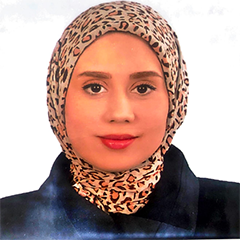Opening the Doors for Community Development
It was during her State University of New York (SUNY) Upstate Medical University’s Bridging Cultures to Defeat COVID-19 program, when Hagar participated in a series of workshops and seminars, that she was able to harness her interest to share research findings and best practices in COVID-19 medicine.
As a Libyan, hearing from the experiences of her peers in the United States and the United Arab Emirates provided insight into the pandemic and the different ways of addressing it. She shares that after the program, she was able to compare the pandemic response in Libya to other countries, helping her to educate and promote healthy practices to her patients in the oral medicine department. Throughout the program, Hager evaluated her own environment where she works, and she became aware of the impact she could have on the hospital as a whole, beginning with her patients, then the department she works in, and eventually the hospital’s overall policies. Participating in this program connected her with peers who shared effective practices which she is eager to pass along to not only her colleagues but the student residents she supervises as well. “The virtual exchange experience gave me the confidence to educate [my] community [on the pandemic]… we prepared a good program to elevate awareness” she shared.
Hager is also a master’s student studying microbiology, and this program stimulated her interest to continue research. At the culminating conference for the virtual exchange program, she presented a project on the topic of xerostomia (or dry mouth) in COVID-19 patients. Afterwards, she was able to build on this initial research and develop it into a larger proposal for her master’s program. She hopes to continue exploring the implications of dry mouth and COVID-19 in patients.
Stepping out of her comfort zone, such as taking the first step into academic life by starting her research, was a result of the global perspectives Hager was exposed to during her virtual exchange. Hager is eager to look out for opportunities like this to participate in again because of how virtual exchange has set her up for success... “I’m so happy to have participated in this [program] because, for me, it changed my skills, my knowledge, and changed a lot of things about my career and life. This was the first time I participated in an international conference, and with this experience, maybe I can use what I learned to develop my country, to develop my university, and to develop my career.”
The Bridging Cultures to Defeat COVID-19 program, implemented by SUNY Upstate, is supported by the Stevens Initiative, which is sponsored by the U.S. Department of State, with funding provided by the U.S. Government, and is administered by the Aspen Institute. The Stevens Initiative is also supported by the Bezos Family Foundation and the governments of Morocco and the United Arab Emirates.

